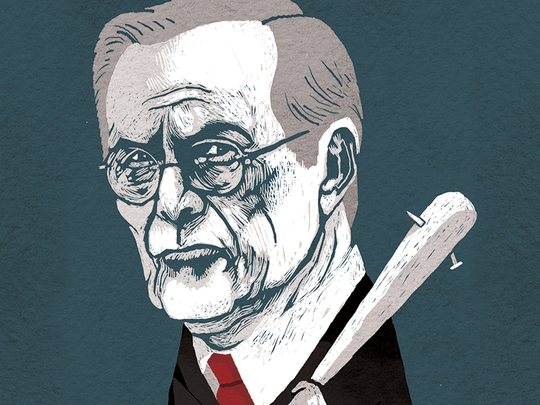
Former United States secretary of defence Donald Rumsfeld was a central figure in Republican Party politics since the 1970s. Best known for his controversial role in pushing the Iraq war and enabling the mistreatment of prisoners from Iraq and Afghanistan, Rumsfeld served as secretary of defence under two presidents — Gerald Ford and George W. Bush. Rumsfeld has held a number of additional posts in major corporations and government advisory bodies.
Although Rumsfeld has maintained a relatively low public profile since serving as Bush’s secretary of defence, he has remained active promoting various public policies and causes.
In 2007, a year after Rumsfeld resigned from office, he founded the Rumsfeld Foundation, which focuses on “encouraging public service in the United States and promoting free political and economic systems abroad”.
Also in 2007, Rumsfeld received a one-year appointment as a visiting fellow at the Hoover Institution, a hawkish think tank based at Stanford University that supplied a number of defence and security advisers to the George W. Bush administration. Rumsfeld’s responsibilities at Hoover included serving on a task force of experts devoted to researching the “ideology of terrorism”.
In 2011, Rumsfeld reemerged, as Politico’s Mike Allen put it, as a “best-selling author, amateur historian, social-media dabbler, and in-demand talking head”. His 2011 memoir, “Known and Unknown”, spent eight weeks as a New York Times bestseller. In conjunction with the book he released a massive collection of documents from his time in government, The Rumsfeld Papers.
Among the issues Rumsfeld broached during his brief reemergence in 2011 was torture, which became the subject of a heated national debate in the wake of the killing of Osama Bin Laden. In May 2011, Rumsfeld contradicted Senator John McCain (R-AZ), who has said that torture has not resulted in useful intelligence, to argue on Sean Hannity’s Fox News show, “I think that anyone who suggests that the enhanced techniques — let’s be blunt — waterboarding, did not produce an enormous amount of valuable intelligence just isn’t facing the truth.” Agreeing with Hannity’s assertion that if “Democrats had their way” about the use of such methods, “we wouldn’t have had this intelligence,” Rumsfeld replied, “You’re exactly right.”
Rumsfeld was characterised by his unwavering insistence that the Iraq war was the correct path for the US to follow after 9/11. His steadfast refusal to admit his mistakes in carrying out the war was equalled by Bush’s adamant loyalty to his defence secretary; upon announcing Rumsfeld’s resignation, Bush gave Rumsfeld’s performance high praise that many felt was at best undeserved. Previously during Rumsfeld’s tenure as Pentagon chief, he twice offered Bush his resignation in relation to the Abu Ghraib scandal, but both times Bush refused to accept it.
One of Rumsfeld’s more well-known statements was that a US pullout from Iraq would result in the country becoming “a haven for terrorists”, marking “an enormous victory for the violent extremists”.
Rumsfeld stubbornly refused to acknowledge the gradual transformation of the conflict in Iraq into a bloody counterinsurgency campaign against surprisingly effective militias.
In April 2003, shortly after the toppling of Baghdad, as the situation on the streets grew increasingly violent, Rumsfeld argued, “free people are free to make mistakes and commit crimes and do bad things.”
He vociferously criticised observers who began using Vietnam-era images to describe the conflict.
As Peter Boyle wrote in the November 2006 New Yorker: Rumsfeld “refused to dignify the chaos with a name that might summon memories of Vietnam. To many conservatives, the Iraq War, quite apart from its strategic implications, was a way of exorcising those ghosts, a chance to demonstrate the national will and military prowess that had arisen in the decades since the humiliating withdrawal from Indochina. Long after others, on the ground in Iraq and even within Rumsfeld’s inner circle in Washington, discerned the ominous signs of a gathering insurgency, Rumsfeld insistently declined to call it such.”
That Rumsfeld lasted as long as he did in the Bush administration was somewhat surprising. Even before the 2004 presidential campaign got off to a start, it was widely believed that Rumsfeld would turn down an offer to return as secretary of defence in a second Bush administration. This was in part because of his age (he turned 72 in 2004), but also because he had by then already been the subject of intense criticism for his handling of the Iraq war and the detainee abuse scandal
President George W. Bush’s decision to replace Rumsfeld with Robert Gates, a realist-inclined former CIA director, was regarded as indication that the Bush administration was finally beginning to acknowledge the facts on the ground in Iraq and elsewhere.
Known as a tough and determined character with the huge personal resources needed to cope with the rigours of his brief, Rumsfeld wrote a pamphlet known as “Rumsfeld’s Rules” — famous in US political circles — which collects nearly 30 years’ worth of quotations and reflections by himself and others.
In a chapter titled “Keeping Your Bearings in the White House”, one entry reads: “If you are not criticised, you are not doing your job.”
Another, in a chapter headed “Serving in Government”, states: “If in doubt, don’t. If still in doubt, do what’s right.”
Rumsfeld’s former deputy, Paul Wolfowitz, once described him as “a constant, active source of energy... he generates a mini-storm wherever he goes”.
Henry Kissinger once said that Rumsfeld was the most ruthless man he knew, adding that he was a “skilled full-time politician-bureaucrat in whom ambition, ability and substance fuse seamlessly”.
Compiled from IPS Right Web and BBC.
This column aims to profile personalities who made the news once but have now faded from the spotlight.












